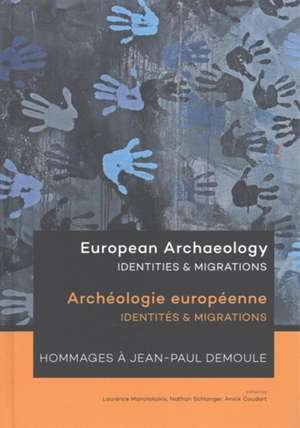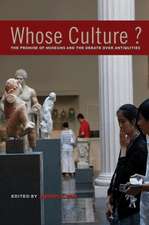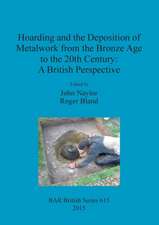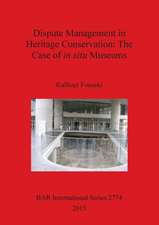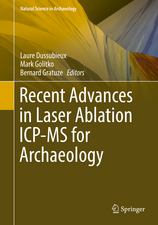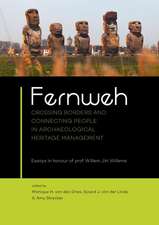European Archaeology
Editat de Manolakakis, Laurence, Nathan Schlanger, Coudart, Anickfr Limba Franceză Hardback – 29 sep 2017
As it appears in diverse guises - and notably as a founding narrative - the past is at the core of every functioning human society. The idea that the past can be known through scientific research has long been a fundamental challenge for western societies and for European researchers, from all disciplines concerned. Through more than four decades of outward-looking archaeological practice, the scholar, teacher and intellectual Jean-Paul Demoule has elaborated a truly global approach to European cultures and their transformations, spanning from the social inequality in Neolithic times to Indo European research to contemporary links between heritage and politics. His colleagues - British, Bulgarians, Czechs, Danes, Dutch, French, Germans, North-Americans, Spaniards, Swiss and Russians - seek to extend and enrich his vision. With contributions (written in French and in English) spanning from prehistory to the modern world, they bring in this volume new insights and data to such issues as the processes of identity construction at different scales, migratory movements in Europe, the status of gender, the role of prestige objects and megalithic monuments in the emergence of social hierarchy and in the semiology of power... without forgetting the myths and realities surrounding the Indo-European phenomenon. Description FranCais:
Le passE sous diverses formes - et notamment celle d'un rEcit fondateur - est au cOEur du fonctionnement de toute sociEtE humaine. L'idEe que le passE puisse Etre connaissable par une recherche scientifique est un enjeu essentiel, particuliErement abordE par les sociEtEs occidentales et notamment par des chercheurs europEens, toutes disciplines confondues. Par sa pratique de l'archEologie et son Erudition, le chercheur et le professeur Jean-Paul Demoule a su Elaborer un tableau global des cultures europEennes et de leurs transformations, incluant autant les origines nEolithiques des inEgalitEs sociales que l'Emergence du mythe indo-europEen ou encore les rapports entre patrimoine et politique. Dans cet ouvrage, ses collEgues allemands, britanniques, bulgares, danois, espagnols, franCais, nEerlandais, nord-amEricains, russes, suisses et tchEques prolongent et enrichissent - en anglais ou en franCais - sa vision. Ils y apportent leurs rEflexions et leurs donnEes concernant les perspectives de l'archEologie du XXIe siEcle, les processus de la construction identitaire A diffErentes Echelles, les mouvements migratoires de l'Europe, le statut du genre, le rOle des objets de prestige et des monuments mEgalithiques dans l'Emergence de la hiErarchisation sociale et de la sEmiologie du pouvoir... sans oublier la mythologie et les rEalitEs du phEnomEne indo-europEen.
| Toate formatele și edițiile | Preț | Express |
|---|---|---|
| Paperback (1) | 482.84 lei 3-5 săpt. | +40.76 lei 7-13 zile |
| Sidestone Press – 5 oct 2017 | 482.84 lei 3-5 săpt. | +40.76 lei 7-13 zile |
| Hardback (1) | 1126.18 lei 38-44 zile | |
| Sidestone Press – 29 sep 2017 | 1126.18 lei 38-44 zile |
Preț: 1126.18 lei
Preț vechi: 1373.39 lei
-18% Nou
215.50€ • 225.45$ • 179.01£
Carte tipărită la comandă
Livrare economică 29 martie-04 aprilie
Specificații
ISBN-10: 9088905215
Pagini: 520
Dimensiuni: 180 x 257 mm
Editura: Sidestone Press
Descriere
English Description:
As it appears in diverse guises - and notably as a founding narrative - the past is at the core of every functioning human society. The idea that the past can be known through scientific research has long been a fundamental challenge for western societies and for European researchers, from all disciplines concerned.
Through more than four decades of outward-looking archaeological practice, the scholar, teacher and intellectual Jean-Paul Demoule has elaborated a truly global approach to European cultures and their transformations, spanning from the social inequality in Neolithic times to Indo European research to contemporary links between heritage and politics. His colleagues - British, Bulgarians, Czechs, Danes, Dutch, French, Germans, North-Americans, Spaniards, Swiss and Russians - seek to extend and enrich his vision. With contributions (written in French and in English) spanning from prehistory to the modern world, they bring in this volume new insights and data to such issues as the processes of identity construction at different scales, migratory movements in Europe, the status of gender, the role of prestige objects and megalithic monuments in the emergence of social hierarchy and in the semiology of power... without forgetting the myths and realities surrounding the Indo-European phenomenon.
Description FranCais:
Le passE sous diverses formes - et notamment celle d'un rEcit fondateur - est au cOEur du fonctionnement de toute sociEtE humaine. L'idEe que le passE puisse Etre connaissable par une recherche scientifique est un enjeu essentiel, particuliErement abordE par les sociEtEs occidentales et notamment par des chercheurs europEens, toutes disciplines confondues.
Par sa pratique de l'archEologie et son Erudition, le chercheur et le professeur Jean-Paul Demoule a su Elaborer un tableau global des cultures europEennes et de leurs transformations, incluant autant les origines nEolithiques des inEgalitEs sociales que l'Emergence du mythe indo-europEen ou encore les rapports entre patrimoine et politique. Dans cet ouvrage, ses collEgues allemands, britanniques, bulgares, danois, espagnols, franCais, nEerlandais, nord-amEricains, russes, suisses et tchEques prolongent et enrichissent - en anglais ou en franCais - sa vision. Ils y apportent leurs rEflexions et leurs donnEes concernant les perspectives de l'archEologie du XXIe siEcle, les processus de la construction identitaire A diffErentes Echelles, les mouvements migratoires de l'Europe, le statut du genre, le rOle des objets de prestige et des monuments mEgalithiques dans l'Emergence de la hiErarchisation sociale et de la sEmiologie du pouvoir... sans oublier la mythologie et les rEalitEs du phEnomEne indo-europEen.
